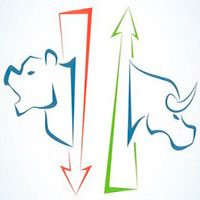The black swan is difficult and sometimes impossible, to predict. And yet, if the markets are falling, it means that someone has started to sell. It means that someone is aware of the situation and decides to act, collapsing the markets. This "someone" is the largest banks, investment funds, insiders, and other "close" people and companies, and then the algorithmic robots, smaller funds, traders, and so on down the chain begin to sell. As a result, the global financial markets collapse.
Studying the characteristics of the black swan event can help you understand recent economic history. In this article, we will discuss what a black swan event is, some examples, how to identify them, and how to react to them.
What Is A Black Swan Event?
Black swan events are global events that are so rare that conventional economic models cannot predict them. They have enormous influence and encourage historians and economists to create explanations for how they might have been predicted or how they follow from other events. The black swan theory was formulated by the economist and bestselling author of "The Black Swan: The Impact of the Highly Improbable" Nassim Taleb.
The term refers to events that are difficult to predict or, on the contrary, obvious but ignored, with significant consequences. In his book, Taleb refers to World War I, the development of the Internet, and the 2008 global financial crisis as black swans.
How To Recognize And Predict A Stock Market Collapse
Predicting the collapse of stock markets and the appearance of the black swan is not easy, but still possible. More precisely, it is possible to prepare for a potential collapse. In order to do that, it is necessary to follow all the events in the world with at least one eye and react to all the loud and negative events. For example, information about the COVID-19 virus outbreak in China and its spreading to other countries appeared long before the collapse of the markets in February-March 2020.
The news that emerged in November 2019, when it was revealed that large U.S. hedge fund Bridgewater Associates, backed by Goldman Sachs and Morgan Stanley banks, had bet $1 billion in put options on the S&P500 and Euro Stoxx 50 collapse by March, is telling. What's even more surprising is that the coming economic crisis had been predicted since late 2018, but no one knew the true cause that would trigger it. At that time, everyone was inclined to believe that the intensification of the economic conflict between the U.S. and China would cause a global recession.
As for events related to political and military conflicts and contradictions, one does not need to have the skills of a genius investor to sense the smell of roast and prepare for the possible consequences. For example, if there is a sharp conflict between the U.S. and other states, you can expect a collapse in oil prices, sanctions, duties, bans, and other types of restrictions. This affects the stock and other markets, 2018 is a prime example.
The only event that individual analysts were able to predict, but which was completely unpredictable or carefully concealed, was the collapse of the U.S. mortgage market and the 2008 global financial crisis that followed. You can determine a black swan event by checking whether an economic event meets the three requirements of a black swan event using this method:
Analyze the impact
The first characteristic of a black swan event is its enormous impact, far beyond the usual economic consequences. If an economic event has had a relatively minor impact, such as a temporary fluctuation in stock prices or currency inflation, it is probably not a black swan event. If economists estimate a loss of value of trillions of dollars, the event is likely to be a black swan event.
Analyze whether conventional forecasting methods could have been used to predict it
The second characteristic of the black swan event is that even using forecasting tools, such as modeling, one cannot anticipate the black swan event. Economists cannot calculate the probability of a black swan event occurring because it happens too rarely for there to be enough data to fully understand why it happens. After the black swan event, economists can build new models that can try to predict black swan events. However, because there is so little data, these prediction models are based on statistical probabilities rather than actual knowledge of which events caused the black swan event.
Thus, if the models for predicting this event are based on a known relationship in which one event causes another event, this event is not a black swan event. If the models are based on the statistical probability of certain events, the event is likely to be a black swan event.
Analyze the public reaction
The third characteristic of a black swan event is the reaction of historians and economists who subsequently rationalize the event as if it could have been predicted. This phenomenon is called "hindsight bias." One way to understand whether hindsight has influenced the public's reaction is to look at when the prediction models for the event were created. If the prediction models were created before the event, it was a predictable event, not a black swan event. If the models for the event did not begin to appear until after the event, it may be a black swan event.
What Causes A Black Swan Event?
Black Swan events are characterized by their unpredictability, and there are several potential causes that can render financial markets unstable and vulnerable to a crash. Exchange rate policies have been responsible for many Black Swan events in the financial markets. The Asian Financial Crisis of 1997, for instance, was sparked by the devaluation of the Thai baht, which set off a chain reaction that resulted in the devaluation of other Asian currencies, such as the Malaysian ringgit and the Indonesian rupiah.
Market instability is another significant contributor to Black Swan events. The Great Depression, for example, was caused by enormous stock market crashes, lack of faith in the financial markets, and absence of a systematic plan to tackle the markets' issues.
Furthermore, regulatory changes in the market may also trigger Black Swan events. In the aftermath of the Great Recession of 2008, there was a significant reduction in risk management and capital requirements due to regulatory changes made to the financial market. The financial markets can become unstable due to various factors that trigger Black Swan events.
What Black Swan Events Occurred So Far?
Whether an event is a black swan is subjective because there is no dollar amount that determines how much loss an event must cause in order to be a black swan event, and the public reaction and predictability of an event can also be subjective. Here are some global events that many economists consider black swan events:
- The 1997 Asian Financial Crisis. In 1997, several Asian countries, including Thailand, South Korea, Malaysia, and Indonesia, experienced rapid growth, massive foreign investment, and significant growth in their real estate markets, contributing to an increase in public debt. When organizations could not repay their debt, it caused a decline that included a currency devaluation of up to 38% and a 60% drop in the value of some stocks.
- The Dot-Com Bubble In 2000. In 2000, the value of technology companies plummeted as investors realized that not all Internet companies would succeed. This event is known as the dot-com bubble, and it wiped out nearly a trillion dollars worth of stocks and the NASDAQ stock market lost 78% of its value.
- Hyperinflation In Zimbabwe In 2008. The years of political conflict and inflation in Zimbabwe peaked in 2008 when the Zimbabwean dollar experienced a period of hyperinflation that reached 79.6 billion percent. In 2009, the Zimbabwean dollar was removed from the country's official currency.
- The Collapse Of The U.S. Housing Market In 2008. In September 2008, the U.S. housing market collapsed because of subprime mortgages that people could not repay. Many banks and corporations that had invested in these assets suffered significant losses. The U.S. government bailed out many major financial institutions and acquired Fannie Mae and Freddy Mac, two of the major mortgage insurers in the United States. Economists estimate that global markets lost $10 trillion.
- European Sovereign Debt Crisis In 2009. In 2009, the banking systems of several European countries, including Portugal, Ireland, Italy, Spain, and Greece, collapsed. These banks were unable to repay their sovereign debt, and the European Central Bank had to bail each of them out at least once.
- The 2014 Oil Crisis. In 2014, a commodity boom prompted the U.S. and Canada to increase crude oil production, and oil shipments to Libya came under the control of Western powers. This increased the amount of crude oil on the market and caused the price per barrel to fall by more than 50%.
- Brexit Announcement In 2016. In 2016, the U.K. voted to leave the European Union. This vote caused the U.K. and EU currencies, the pound and the euro, to depreciate rapidly and caused up to $2 trillion in losses in global markets.
How To Protect Assets From A Possible Collapse
Suppose you react to a significant event, do some analysis, and conclude that a financial market crash is imminent. What should you do?
- Option 1. Do not panic. The easiest solution is to get out of stocks, cryptocurrencies, and other assets into cash in advance, preferably the Swiss franc as one of the most stable currencies. After the situation settles down, you can buy the sold assets again. It would be convenient and useful to those who do not have a wide range of assets at their disposal and experience in hedging with options or other types of derivatives. That way in advance you will be able to protect yourself from potential losses.
- Option 2. Use put options on those assets which you have in your portfolio. Put options give you the right, but not the obligation, to sell the assets at a specific price on a specific date. That is, at the time of the expiration (settlement) date of the option, you can either sell your assets or give up and keep them. For example, you have a bitcoin in your portfolio that you bought at $7,000 and its current price is $10,000. You believe that the markets will collapse in the next 6 months and so you buy a put option that gives you the right to sell the bitcoin at $9500 in 6 months. If a collapse occurs within 6 months, whatever the bitcoin price is on the expiration date of the option, you sell it for $9500. Thus, you lose only $500 of the bitcoin value + the option value, which will be about the same $500. The final loss would be $1000. However, if the market suddenly crashes by more than 10%, you will save your capital. So you can protect all your assets, but this option has one problem - only professionals can use options correctly. The rest of us can do something wrong and lose more than we could have saved. What to do?
- Option 3. Use an intuitive exchange, even for beginners, where you can buy assets "physically" from which to form a portfolio and where you can open trading positions with leverage. Let's say you bought 10 different assets and formed an investment portfolio of them. At some point, you thought the markets might crash and to avoid losses all you have to do is to place limit orders with leverage to sell when the price reaches a certain level.
How To React To Black Swans?
Reacting to the factors described by Taleb is a matter of experience and "observation". The more you analyze the market and learn to understand how capitals work and how different processes work, the easier it will be for you to react to changes. Use services for monitoring and analytics - for example, by the dynamics of the withdrawal of cryptocurrencies from wallets you can predict the coming collapse. It is also worth studying the history of the financial market and cryptocurrencies - often patterns repeat themselves. For example, financial crises happen every 7-11 years, but bitcoin grows in leaps and bounds - the boom usually happens every 4 years. What patterns can be seen in these events and what precedes them? Understanding macro-trends will help to accept changes more calmly and sometimes predict them independently.
Conclusion
To sum up, black swan events are notoriously difficult to predict, making it challenging to prepare for them. Nevertheless, conducting thorough research and establishing a stable portfolio can enhance your chances of success during such events. In addition to the above-mentioned strategies, exercising caution while investing during a black swan event is crucial.
While it may be tempting to put all your resources into a stock that you believe will perform well during such an event, diversifying your investments and retaining a significant portion in cash can serve as a safeguard in the event of a black swan event.

















